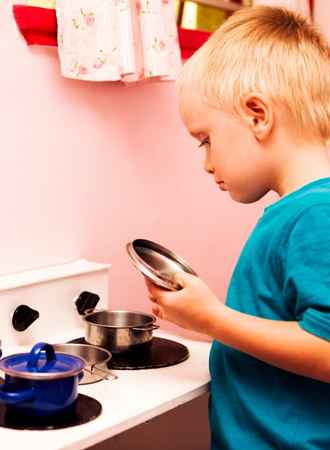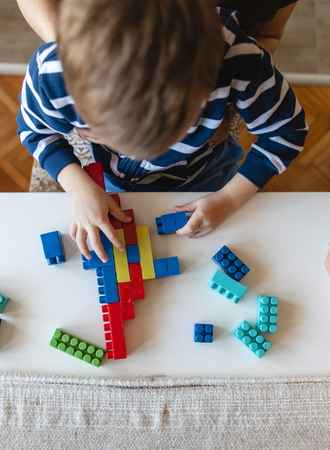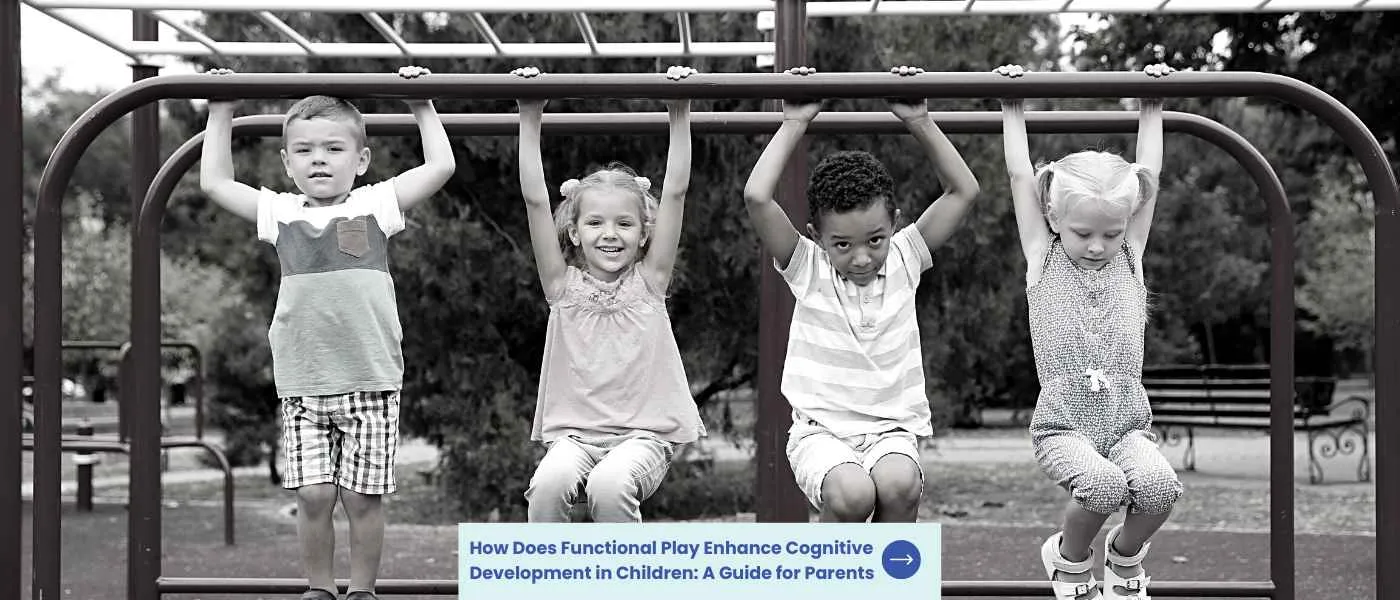Playtime is an essential part of a child’s development. But does functional play enhance cognitive development in children? The answer may surprise you!
This type of play can be incredibly beneficial for young minds, helping to improve analytical thinking skills and even aiding language acquisition. In this blog post, we’ll explore the benefits of play, how to incorporate it into your child’s routine and potential challenges with introducing it.
Key Takeaways on Functional Play
- Functional play is an essential part of a child’s development, as it helps to foster cognitive and social skills.
- This type of play is a also a great way to help children develop important skills such as communication, motor coordination, and social interaction.
- This play has many forms, including pretend play, construction play and outdoor activities.
What is Functional Play
Functional play, often referred to as “sensorimotor play,” is one of the earliest forms of play that children engage in. It’s characterized by simple, repetitive actions in which children explore and experiment with objects just to see what they can do.
| spect | Details |
|---|---|
| Definition | Functional play involves repetitive actions and behaviors using toys or objects, where the child is focused on the process rather than any end goal. |
| Age Range | Typically observed in infants and toddlers, usually between the ages of 6 months to 2 years. However, it can continue into older ages as children explore new objects. |
| Characteristics | – Repetitive actions (e.g., banging a drum, stacking blocks, pushing a car back and forth) – Exploration of objects to understand their properties – No structured goals or end results |
| Purpose | – Development of motor skills – Understanding cause and effect (e.g., “If I push this car, it will roll.”) – Exploration and understanding of the physical world – Sensory exploration and satisfaction |
| Examples | – An infant shaking a rattle repeatedly to hear its sound <br> – A toddler filling and emptying a bucket with sand – Pushing buttons on a toy to see lights or hear noises |
Benefits of Functional Play in Child Development
Functional play is powerful tool and an important part of a child’s development, as it helps to teach and foster cognitive, social and motor skills as well as functional play skills. It also helps a child learn about the world around them and develop their own unique set of skills.
| Benefit Category | Benefit | Description/Examples |
|---|---|---|
| Motor Skills | Development of Gross Motor Skills | Functional play often involves large body movements. For instance, a toddler might push a toy car back and forth or bounce a ball repeatedly. |
| Development of Fine Motor Skills | Handling toys, turning them over, or fitting objects into containers enhances dexterity and hand-eye coordination. | |
| Cognitive Development | Cause and Effect Understanding | By engaging in repetitive actions, children begin to understand the relationship between cause and effect. For example, if they shake a rattle, it makes a sound. |
| Exploration & Experimentation | Children get to experiment with different objects, understanding their properties and how they work. For instance, discovering that sand can pour like water but can also be molded so it helps develop problem solving skills. | |
| Sensory Development | Sensory Exploration | Functional play often engages multiple senses. A child might enjoy the texture of playdough, the sound of a drum, or the visual patterns of a spinning top. |
| Emotional Development | Self-Efficacy | Engaging with and manipulating objects successfully can boost a child’s confidence in their abilities. |
| Frustration Management | If a child struggles with a particular action (e.g., fitting a shape into a shape sorter), they learn patience and persistence. | |
| Social Development | Turn-Taking | When engaged in functional play with peers, children begin to understand concepts like sharing and turn-taking, even if it’s just passing a ball back and forth. |
| Language Development | Vocabulary Expansion | As children play, they begin to learn the names of objects and actions, expanding their vocabulary. |
| Understanding the World | Physical World Exploration | Through functional play, children grasp basic physics principles, like gravity (things fall) or buoyancy (things float). |
It is a type of play that involves playing with toys or objects according to their intended function.
Cognitive Development
As a child begins a play activity, it encourages cognitive development by providing opportunities for creative thinking. By playing with toys such as puzzles or building blocks, children can practice critical thinking and reasoning while developing their understanding of cause-and-effect relationships.
Pretend play with a baby doll in a high chair or play kitchens allows children to explore different roles and scenarios through dramatic play, which can help them better understand how things work.

Social Skills
As children interact with others during physical activity, parallel play or any social play sequences in kids play, they are sharing enjoyment and sensory experiences with other children.
Through these interactions in a social context, they can practice taking turns, sharing ideas, resolving conflicts peacefully and working together towards a common goal in a fun way.
These experiences with action sequences using new toys will help build strong interpersonal relationships which are essential skills for success in life later on down the road.
Physical Development
This play also promotes physical development in young children by helping them develop gross and fine motor skills. It also helps to develop coordination, balance, strength, agility, flexibility and endurance – all of which are necessary for everyday tasks throughout life like writing or tying shoelaces when doing physical play.
Engaging in outdoor activities such as climbing trees, pushing carts, throwing a ball, riding merry-go-round or playing with playground equipment, will provide further opportunities for physical growth while having a sense of fun at the same time.

Types of Functional Play
Here are the different forms of this play:
Pretend play
Pretend play develops cognitive skills. Through pretend play, children can learn to use their imagination and creativity as they discover different roles and situations. They can also practice solving problems as they come up with solutions to the challenges presented in the game.
Building blocks
Building blocks and puzzles are another type of play that help children develop their cognitive abilities. With building blocks, kids can work on improving their hand eye coordination while learning about shapes and colors at the same time as well as participating in creative play.
Puzzles provide an opportunity for them to think critically as they try to figure out how all the pieces fit together.
Outdoor play
Outdoor activities such as running around outside or playing tag are great ways for kids to get some physical exercise while also developing their cognitive abilities and developing skills through exploration and discovery.
These types of activities allow them to observe nature first hand, which encourages creative thinking by inspiring curiosity about the world around them.

How to Incorporate Functional Playtime Into Your Child’s Routine
Incorporating play called called functional play into your child’s routine is an important part of their cognitive development. This play helps children learn to think, problem solve, and explore the world around them in a fun and engaging way. Here are some tips on how to this play into your child’s routine:
Set aside time for playtime

It’s important to set aside time each day for unstructured play activities and social interactions. This allows your child to discover different types of toys and activities without feeling rushed or pressured. Try setting aside at least 30 minutes per day for free-play where you can observe but not interfere with what they are doing.
Provide appropriate toys and materials for the age group
Make sure that the toys you provide are age appropriate so that they can be enjoyed safely by your child. Younger children should have larger pieces that won’t pose a choking hazard while older kids may enjoy more complex games or puzzles that require more thought processes such as counting or matching colors.
Encourage creative thinking

During playtime, encourage creative thinking by asking open-ended questions about what they’re doing or why they chose certain materials over others to create it. You can also introduce simple problem solving activities like building towers out of blocks or creating mazes out of cardboard boxes which will help develop their critical thinking skills further down the line.
Potential Challenges With Functional Play
When incorporating play into your child’s routine, there are some potential challenges that may arise.
One of the most common is a limited attention span in young children. This can be especially difficult for parents who are trying to engage their child in activities that require focus and concentration. To help combat this issue, it is important to provide short bursts of activity rather than long periods of uninterrupted playtime.
Additionally, providing support and frequent breaks throughout the day can help keep your child engaged and interested in what they are doing.
Another challenge with play is a lack of interest in certain types of activities or toys. If your child seems uninterested or bored by an activity you have chosen for them, try switching up the materials or environment to make it more engaging and exciting for them.
For example, if they don’t seem interested in building blocks, try introducing other construction-based activities such as LEGO sets or cardboard boxes instead. You could also take them outside to explore nature and build things together using natural materials like sticks and stones!
Remember that every child learns differently so it is important to be flexible when creating a plan for incorporating play into their daily routine. Some children may respond better to shorter sessions while others may need longer ones. Experiment with different lengths until you find something that works best for your family dynamic.

5 Tips for Parents on Promoting Cognitive Development Through Functional Play
Parents can promote cognitive development in their children through play. Functional play is a type of play that involves a child’s problem-solving skills, exploration, and creativity.
It helps to learn life skills, such as communication, motor coordination, and social interaction. Here are some tips for parents on how to incorporate play into their child’s routine:
Parents should provide an environment where their child can explore different types of toys and activities. This will help them learn new skills while having fun at the same time. Examples include puzzles, building blocks, art supplies, musical instruments, outdoor games like tag or hide-and-seek etc.
Encouraging open-ended questions during playtime allows your child to think critically about what they are doing and encourages creative thinking.
These types of questions allow your child to come up with solutions by using trial and error methods which helps them build problem solving skills over time. Provide forms of positive reinforcement or rewards during successful play attempts.
Fostering curiosity in your child can lead to more learning opportunities for them down the line.
During their playtime sessions, ask questions about what they are doing; this will help encourage critical thinking and provide an opportunity for conversation between parent and child which promotes healthy communication habits from an early age of childhood onwards.
For example, if they are playing with building blocks, inquire why they chose certain shapes or colors instead of others.





